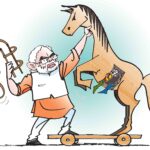- Cover Story
- Governance
- Globe Scan
- Corruption
- State Scan
- Talk Time
- Cover Story
- Governance
- Globe Scan
- Corruption
- State Scan
- Talk Time
Recent Posts
© Copyright 2007 - 2023 Gfiles India. All rights reserved powered by Creative Web INC.Cover StoryA hegemon in the making
Modi has shown clear signs of an emerging supreme ruler but how or where he will really lead India is yet to be clearly seen
BN UniyalJuly 7, 20147 Mins read468 Views
 Written by BN Uniyal
Written by BN UniyalIT was clear from the very beginning of this election campaign that NarendraModi is not a leader from the traditional mould. His rise in the party was phenomenal, his campaign was awesome, his speeches from the hustings masterly and the majority he has won is simply staggering. His success in securing the total submission of the many recalcitrant elements in the party without even raising a finger or any bloodletting has been remarkable. Now, by swiftly installing his man at the top of the party organisation he has brilliantly established himself as the boss, as his man, Amit Shah, is known to call him, at least, at his back, if not to his face. All this shows that he is not merely different from other leaders but outright distinct. We had in the medieval ages a term for such a leader/ruler: ekchhatra, an all-covering, umbrella-like ruler. The Greeks called such a leader a hegemon and the Germans übermunsch—superman. It is no wonder that some caricaturists actually chose to draw him as Superman of the popular cartoon strip on TV shows.
A hegemon differs from a mere leader, even a charismatic leader, who is just the first among equals. A hegemon is simply superior to his contemporaries and rules supreme, establishing his hegemony over all aspects of a nation’s life of his time by sheer force and dazzle of personality, promise and performance. He transforms the vocabulary of national discourse, often even the very language of that discourse, sets some new trends in fashion, buries the old ideas and puts forth a new paradigm, leaving it for others to judge whether for good or for bad. Gandhi was a hegemon in that style in his time and so was Modi’s hero, Sardar Patel, though only in a narrower sense.
There was another Gujarati hegemon who once sat like a lord over Congress affairs. His name was Sir Pherozshah Mehta whose authoritative bronze statue stands today at the entrance of the BrihanmumbaiMahanagarPalika. Once when confronted by an impetuous young Congressman with the charge that partymen were not able to speak freely in his presence because of his overawing personality, he snubbed him with the words, “My personality, sir, yes, my personality, but tell me, sir, what shall I do about it?”
We have simply too littleinformation with us even tomake a guesstimate of howhe is going to turn Indiainto the BJP’s promisedShreshtha Bharat—themost excellent nationModi has shown clear signs of being an emerging hegemon but how or where he will really lead India is yet to be clearly seen. The time to reckon whether his rise to power marks a change of era or is merely a change of regime is still a bit distant in the future. It, is, therefore, too early in the day to begin measuring him against his election promises, as some rather impatient TV anchors have begun doing. We have simply too little information with us even to make a guesstimate of how he is going to turn India into the BJP’s promised Shreshtha Bharat—the most excellent nation. We have no indication either of how he is going to minimisethe government and maximise governance or end corruption which were his key election promises. Everybody, therefore, must be waiting anxiously for his first budget to see what is in store for India of the next five years under Modi.
Some of his campaign remarks may, however, be helpful in unravelling his mind, his way of working, and the qualities he must want to see in men working for him, under him and with him to attain what he has set out to achieve during his five-year term. On quite some occasions during the election campaign, he made it a point to emphasise his caste. “…I am a baniya, you know?” he said, pointedly stressing the word baniya, by which he seemed to mean that he is a commonsensical, workaround man with a mind uncluttered by any isms or presuppositions, interested in counting his money at the end of the day and not in ideologising. Some of his other common remarks during the campaign were: “It is all so simple… it can be done easily…it does not require a big idea or big money to do…it just requires application of mind.” These remarks were made in the context of the silly and thoughtless babu ways of doing things by rules and rote rather than by weighing the exigencies of constantly changing real-life situations, like failing to give priority to perishable commodities over un-perishable stuff on the railways. While saying this he may have appeared to be hitting out at the babus, but his real targets were clearly their political bosses. What he was saying was that if India found itself in a sorry state, that was simply because it had long been let down by an utterly incompetent, unimaginative and thoughtless political class. Simply put, he was blaming it all on the headless chickens of the Congress and, of course, other rival parties.
CONTRARY to such political bosses, he presented himself as a responsive, imaginative and innovative man. “Simple” was one of his favourite words. Another was “practical” and yet another “dimag’” which he used in the sense of astute wakefulness to problems, a quality he seemed to say he possessed in abundance, as evidenced by the success of hisGujarat model. It is to be noted that never during the campaign did he claim to have done any big things in Gujarat. He did not make tall claims nor seek applause from his audience for any heroic acts or grandiose achievements. He did not boast he had performed miracles. He only said that he could do better what others did badly, do right what others did wrong, do all that faster than others and, maybe, at a lesser cost. If that raised deafening applause and lusty cheers for him, it was simply because the people who came to his rallies had been driven to utter desperation by a government that had bungled matters at every step during the last five years.
SO, Modi has not promised to do anything different from what others have done before. He has only promised to do it differently, efficiently, quickly and, at a lesser cost to the exchequer and the citizens at large by cutting out the clutter and controlling corruption. That, he said, he would do by what the management gurus call systems improvement and better man management, practices developed in America during the last four or five decades. Thus, while the goals may remain the same as before, the ways of realising them will change. The Modi approach will be to look for and adopt simple, workable solutions without bothering about ideological niceties. That marks the end of Nehruvian socialism under which we have lived ever since Independence in 1947. Socialism may still remain enshrined in the Constitution but for all intent and purposes it will be dead as a dodo.
Modi, however, should not be credited or blamed for the death of Nehruvian socialism which had long been in the throes of death. Rajiv Gandhi was the first to take up the shovel to dig a grave for it. After him, PV Narasimha Rao and, ironically, his Finance Minister, Manmohan Singh, gave it a big kick in the shins, liberalising the licence-quota-permit raj and opening the economy to domestic and foreign competition. Had the two of them not done that, India would have by now slipped into the category of decrepit nations like Castro’s Cuba and Il-sung’s North Korea. In that sense, Modi has half his task already done by his Congress predecessors. He has now only to act smartly to deliver his promise of Shreshtha Bharat, free from the chains of Nerhruvian socialism.
The Modi approach will beto look for and adoptsimple, workable solutions without bothering aboutideological niceties. Thatmarks the end of Nehruvian socialism under which wehave lived ever since IndependenceWhat will, then, replace socialism under Modi? He may have the immense common sense of a baniyato assist him but common sense alone cannot be enough to run—and run efficiently—large modern systems and give those who have to run such systems a sense of continuity and stability, and a sense of comfort. However much Modi may hate ismsand ideologies and however much he may despise vacuous theorising, he must know that a bureaucracy as large as India’s cannot work without some sort of an overarching philosophical grounding. America and China, the two countries he seems to admire, have not achieved what they have in a philosophical vaccum. China has changed radically over the last some decades from a totalitarian Marxist-Leninist-Maoist regime into a vigorous free market economy, but it has not abandoned its Marxist underpinning. The entire old Marxist structure remains totally in operation and still serves as a guiding light. American modern management practices too have not evolved in a philosophical vaccum. The West European states evolved ideas of liberty, liberalism and welfarism from a long tradition of Protestantism and humanism. Eastern Europe chose Marxism which also had a long philosophical history behind it. America developed its modern management practices from the philosophical systems of Peirce, James, Wright, Dewey and Mead. Many men of action often feel uneasy at the very mention of the word ‘philosophy’, failing to appreciate the fact that their acts themselves are shaped by the thoughts of one or other philosophical school, though they may not be aware of it. Even the modern management practices and jargon that Modi seems to be so fond of and which he seems to have picked up during his long and close interaction with his friends from the corporate world have come from the same mainspring of modern American philosophy.
In his first speech in the Lok Sabha, Modi gave some indication of his possible intent to develop a new philosophical system of his own to replace Nehruvian socialism by welding together the thoughts of Gandhi, Lohia and DeendayalUpadhyay. But philosophical systems that provide the underpinning for politics of the day are seldom developed by politicians themselves. That is for philosophers and academicians of some brilliance to do. Gandhi, Lohia and Upadhyay all had some sparks but they were just sparks. Upadhyay propounded some sort of a philosophical framework by the name of Integral Humanism but that has yet to be developed into a reasoned and mature philosophical school, if it has to serve as a tool for action.
BN Uniyal covered Parliament and political parties for over three decades, beginning his career as a journalist in the 1970s.
Recent Posts
Related Articles
Cover StoryTablighi Jamaat : 1000 years of revenge
Written by Vivek Mukherji and Sadia Rehman Two contradictions are evident. Through April...
ByVivek Mukherji and Sadia RehmanMay 5, 2020Cover StoryWINDS OF CHANGE
Written by Gopinath Menon ADVERTISING : The name itself conjures up exciting images....
ByGopinath MenonMarch 4, 2020Cover StoryTHE ECONOMIC ROULETTE WHEEL
Written by Alam Srinivas THE wheel spins, swings, and sweeps in a frenzied...
ByAlam SrinivasMarch 4, 2020Cover StorySYSTEMS FAILURE, SITUATION CRITICAL
Written by Vivek Mukherji ONE of most quoted allegories of incompetence for a...
ByVivek MukherjiMarch 4, 2020 - Governance
- Governance

























































